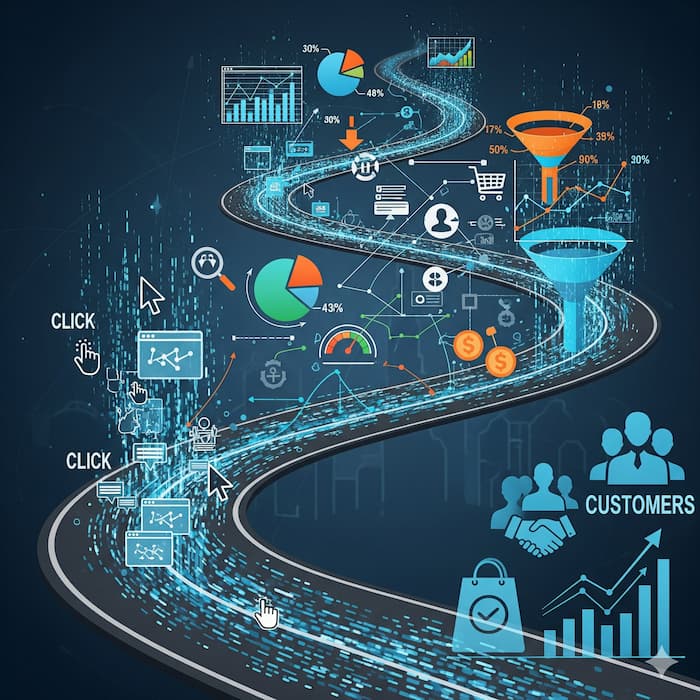From Clicks to Customers: Unleashing the Power of Data Analytics in Digital Marketing

The digital landscape has evolved beyond flashy ads and guesswork. Today, success hinges on understanding what customers truly want and how they behave online. Data analytics in digital marketing provides that edge by turning raw numbers into powerful insights. From audience targeting to personalized campaigns, businesses that leverage analytics transform clicks into loyal customers, boosting ROI, improving engagement, and staying competitive in a fast-changing marketplace.
Why Traditional Marketing is Not Enough Anymore
In the past, businesses relied on TV commercials, print ads, and word of mouth to reach audiences. While effective to a degree, these methods lacked precision. Today’s consumers expect personalization, instant responses, and measurable value. Traditional marketing simply cannot match this demand. That’s where data analytics in digital marketing takes center stage, offering accuracy, adaptability, and actionable insights.
Limited Reach and Tracking
Traditional channels may reach large audiences but cannot track detailed customer journeys. With digital marketing and analytics, businesses monitor user actions, clicks, purchases, or time spent on a page, making every campaign measurable.
Consumer Behavior Has Changed
Today’s customers research online before buying, compare multiple options, and engage across different platforms. Digital marketing data allows businesses to map this behavior and meet customers at the right place and time.
Competition Demands Precision
Every industry is saturated with competitors. Guesswork is no longer sustainable. Digital analytics for marketing ensures every marketing dollar is allocated effectively, giving brands a competitive edge.
The Blueprint of a Data-Driven Marketing Strategy
A winning digital strategy is never a matter of chance, it’s the result of deliberate planning backed by solid insights. Businesses today cannot rely on assumptions alone; they need measurable data to guide every move. By using data analytics for digital marketing, companies gain clarity on what works, what doesn’t, and where to allocate resources for maximum impact. This blueprint involves defining goals, identifying relevant data sources, segmenting audiences, and optimizing campaigns continuously. With the right structure in place, brands can transform scattered efforts into powerful, results-driven marketing strategies that scale with precision and confidence.
Define Clear Goals
Before diving into metrics, businesses must decide what they want to achieve, brand awareness, lead generation, or sales. Without goals, digital marketing and data analytics can become overwhelming and unfocused.
Identify the Right Data Sources
Not all data is equal. Businesses should combine website analytics, social media insights, email campaign data, and customer purchase history. A data analytics company often helps brands integrate these diverse data streams.
Segment the Audience
Every customer is unique. By dividing audiences into groups based on demographics, location, or interests, brands can deliver personalized campaigns. This approach demonstrates the power of data analytics in driving relevance.
Choose the Right Tools
From Google Analytics to advanced AI-driven dashboards, businesses have access to countless tools. Partnering with a Digital Marketing Agency in Dubai can streamline this process and ensure the right technology is used.
Continuously Test and Optimize
Data-driven strategies are never static. Regular A/B testing, campaign analysis, and customer feedback loops ensure that marketing evolves with the audience.
From Clicks to Conversions: The Journey of the Customer
Capturing a click is just the beginning. The real challenge is converting that interaction into a sale, and eventually, into loyalty. Here’s how data analytics in digital marketing makes it happen:
Awareness: Reaching the Right Audience
At this stage, businesses must be visible to potential customers. Using digital marketing data, marketers identify which platforms (social media, search engines, email) attract their audience.
Interest: Crafting Compelling Content
Clicks don’t matter if the content doesn’t engage. By analyzing metrics like bounce rates and time on page, marketers adjust their strategies. A marketing agency in UAE can design campaigns that align with audience preferences.
Consideration: Building Trust
During this phase, customers compare brands. Digital analytics for marketing allows businesses to track competitor performance, gather reviews, and highlight unique selling points.
Conversion: Sealing the Deal
The final step is purchase. Data analytics in digital marketing tracks which campaigns convert best, allowing businesses to double down on what works and improve underperforming areas.
Retention: Turning Buyers into Advocates
A loyal customer is worth more than a one-time purchase. Personalized follow-ups, loyalty programs, and targeted content, driven by digital marketing and analytics, increase customer lifetime value.
Also Read: Artificial Intelligence in Digital Marketing
The Power of Data Analytics in Digital Marketing
The true strength of analytics lies in how it transforms decision-making. Businesses no longer rely on intuition but on evidence-backed insights. The power of data analytics unlocks opportunities that traditional marketing could never achieve.
- Personalization at Scale: Customers receive content tailored to their behavior, increasing relevance.
- Enhanced ROI: By targeting the right audience, businesses avoid wasted ad spend.
- Predictive Capabilities: Advanced data analytics in digital marketing forecasts trends, helping companies stay ahead.
- Customer-Centric Focus: Businesses understand customer needs deeply, creating stronger brand loyalty.
For companies seeking structured growth, working with a Data analytics company or leveraging the expertise of a Digital Marketing Agency in Dubai can maximize these benefits.
Building a Data-First Culture: The Human Element
While tools and numbers matter, people are at the heart of every strategy. A successful marketing approach blends analytics with creativity and empathy.
Empowering Teams with Insights
It’s not enough to collect data; teams must be trained to interpret and use it effectively. Encouraging a culture of learning ensures data analytics in digital marketing is fully leveraged.
Balancing Data and Creativity
Numbers guide decisions, but creativity builds emotional connections. Marketers should combine both, ensuring campaigns resonate while remaining measurable.
Ethical Data Usage
With great power comes responsibility. Transparency, privacy, and ethical use of digital marketing data build trust with customers, ensuring long-term loyalty.
Leadership Buy-In
For analytics to thrive, company leaders must champion a data-first mindset. When executives value and act on insights, the entire organization follows.
Also Read: How to Use Digital Marketing to Enhance Brand Awareness
FAQs
What is data analytics in digital marketing, and why is it important?
Data analytics in digital marketing is the process of collecting, analyzing, and interpreting online customer data to optimize marketing campaigns. It’s important because it turns clicks into conversions, ensures campaigns are cost-effective, and provides a deeper understanding of customer behavior.
What kind of data should I be collecting for my marketing campaigns?
Businesses should gather digital marketing data such as website traffic, social media engagement, email open rates, purchase history, and customer demographics. This data allows for precise targeting and campaign optimization.
How can I use data analytics to personalize my marketing efforts?
By segmenting audiences and analyzing behavior patterns, businesses can tailor content, offers, and recommendations. Data analytics for digital marketing ensures that customers receive relevant messages at the right time, improving engagement and conversion rates.






